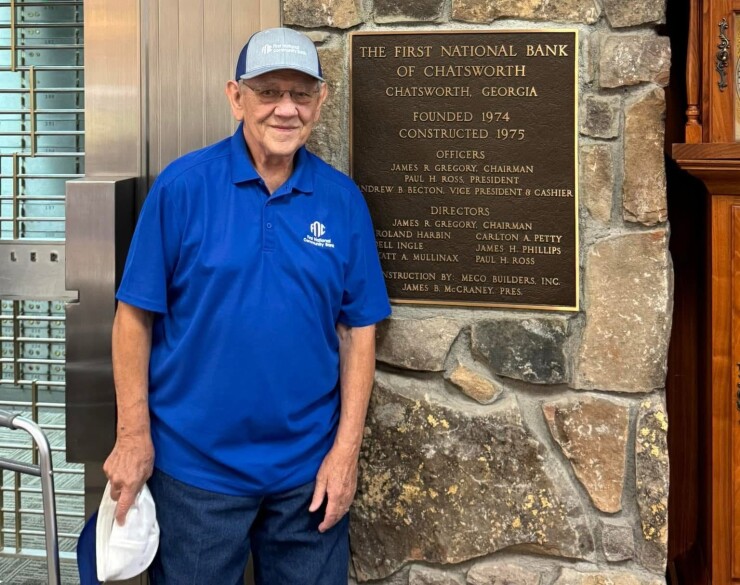
There's no way Roland Harbin could have known, but when he agreed — reluctantly — to join a group organizing a community bank in Chatsworth, Georgia, he was signing up for the long haul.
The bank he helped found, First National Community Bank, turned 50 years old last month. Harbin, a retired pharmacist, has served as a director for that entire span.
"Mr. Harbin still serves on our holding company board of directors," CEO Ryan Earnest told American Banker. "He's very active in our Chatsworth-Murray County headquarters market, but also still very involved with the bank."
The $700 million-asset First National is the bank subsidiary of First Chatsworth Bankshares. Chatsworth, located in Northwest Georgia, had a population of just over 4,900 in 2024, according to the U.S. Census Bureau.
Harbin, who is 86, told American Banker that he quickly came to love his involvement with the bank. "My whole life has been taking care of people," Harbin said. "Just as I wanted to keep people healthy at the pharmacy, I wanted to keep people financially healthy at the bank."
Harbin's current enthusiasm stands in sharp contrast to the hesitation he demonstrated when First National founder Paul Ross recruited him for the organizing group in 1974.
"They knocked on my door a little after supper," Harbin recalled of Ross and another founder, Murray County Tax Commissioner Jimmy Gregory. "As soon as I spotted them, the thought hit me that `Uh-oh, they're going to organize a bank.'"
"On my own I would never have thought of organizing [a] bank, but I sure did hope someone would,' Harbin added.
Harbin's attitude was understandable. His pharmacy, opened in 1967, was still relatively new. At home, Harbin and his wife were busy raising three children. There wasn't a lot of investable cash in the family coffers.
"When I opened the door, I said, `Fellas, don't say anything that is confidential,'" Harbin recalled. "`I know you're wanting to start a bank. I'm all for it, but I don't have any money.'"
Gregory was quick to dismiss Harbin's concerns. "[He] spoke up and said, `You can borrow money, just like I can.'"
After that rocky introduction, Harbin played a central role in the creation of First National, which was originally named First National Bank of Chatsworth. Harbin hosted many of the organizing meetings in his house. When the time came for the first shareholder meeting, in the cafeteria of the local junior high school, it was standing room only, he recalled.
First National opened for business on Aug. 18, 1975, in the midst of a tumultuous period for banks. Buffeted by volatile energy prices and unprecedentedly high interest rates, more than 350 banks around the country failed in First National's first decade. Even more would fail in the second half of the 1980s, but the locally focused First National rode out the storm and built market share in its core market of Murray County. Presently, it holds 35% of the jurisdiction's $442 million deposit market, according to the Federal Deposit Insurance Corp.
First National grew into its present 11-branch footprint, via two small deals and de novo expansion. While its story may lack flash, First National has been a steady earner, reporting net income totaling $6.2 million for the first six months of 2025, up 8% from the comparable period in 2024. First National reported full-year profits for the 10 years prior to 2025.
Examples of older directors continuing their board service are becoming increasingly common, James Drury, the founder and CEO of JamesDruryPartners, a Chicago-based consulting firm that specializes in corporate board advisory services, told American Banker.
"It's not unusual, not unusual at all," Drury said. "Age limits used to be set at 68 or 72. Nowadays, there are many instances of directors serving on the boards of major companies into their late seventies … I think a company might look back at a director like that and say, `Part of our success is due to the board counsel we've gotten.'"
"It really depends on the individual, not the calendar," Drury said. "I would say when you have a director that's got that much experience on the board, great tenure, they have a perspective other directors don't have. They understand the legacy of the company, not just what the company is lately."
For First National, a major turning point came in 2011, when it changed its name after 36 years, becoming First National Community Bank. The seemingly modest switch paved the way for substantial growth, according to Harbin. "I think it was one of the best moves we've made," the retired pharmacist said. "It allowed us to fit into Dalton, Calhoun … anywhere."
"The name travels well," Earnest said. "It tells who we are and what we stand for. … A local bank with local decisions being made."
First National's most recent expansion was into Paulding County, south of Murray in the Atlanta metropolitan area, where it
"Carefully calculated and controlled organic growth has been a very successful model for us the past four years," Earnest said. "We feel like the best value proposition for our shareholders is to continue that solid and steady trajectory up."
For his part, Harbin has no regrets, nor any immediate plans to step away from the bank. "When you start from nothing, and you feel like you've played an effective role in helping an organization grow, remain safe and protect the shareholders as well as the depositors … it all kind of ran together. I enjoyed the whole time."





